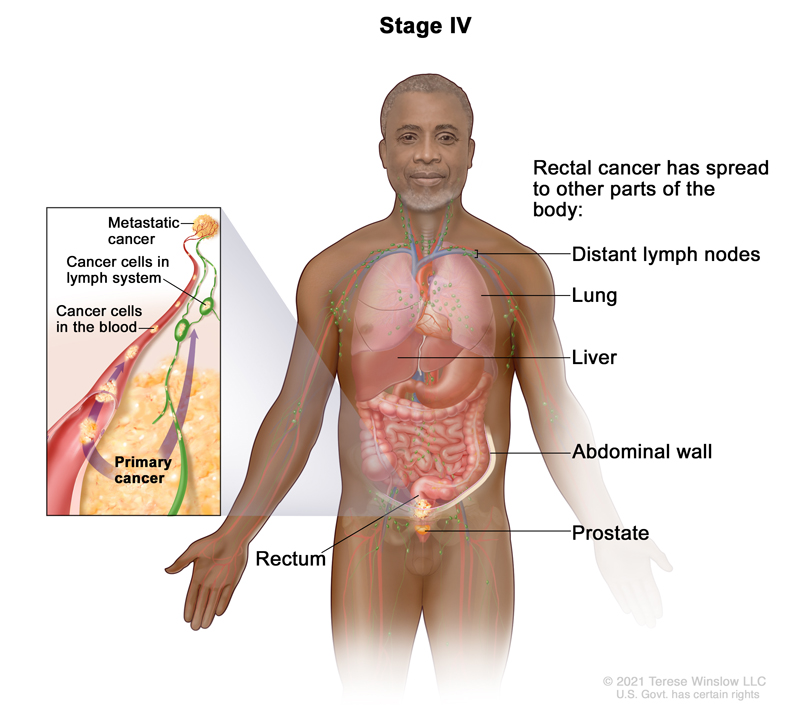Stage 4 Rectal Cancer ICD 10 is C20.
Tap “Watch Now” to learn more and for an easy-to-understand overview of the cancer stage.
- Stage 4A Rectal Cancer
- Stage 4B Rectal Cancer
- Stage 4C Rectal Cancer
Overview
A Stage 4A Rectal Cancer diagnosis means that the cancer has spread from your rectum, through the blood and lymph nodes to one other part of your body, such as liver, lungs, bones, etc.
What Tests Will I Need and Why?
A Rectosigmoidoscopy (a thin tube with a camera that is introduced through your anus to see the inside of your colon) is usually the first step to identify the tumor inside your colon and take samples for analysis.
Blood and Imaging tests are done to understand your general health, confirm your diagnosis and determine your cancer stage.
Tissue analysis is also typically done through a biopsy to identify certain biomarkers and mutations, which is critical to finding the best treatment option for you. In Colorectal Cancer, there are 4 common biomarkers that can be found: RAS mutations (NRAS and KRAS), BRAF mutation, Microsatellite Instability High (MSI-H) and HER2. 40-50% of Colorectal Cancers have a RAS mutation.
If your treatment team has not already performed tests to determine your cancer’s features, please ask your doctor when these tests will be performed.
Re-read this summary as needed and then tap, “Compare My Treatment Options Now“. Our unique Comparison Page will help you understand your FDA-approved treatment options including, who can help you pay for your treatment, where and how each is given and what side-effects you may experience.

National Institute of Health/ treatment-rectal
Overview
Stage 4B Rectal Cancer diagnosis means that the cancer has spread from your rectum, through your blood and lymph nodes to more than one other part of your body, such as liver, lungs, bone, etc.
What Tests Will I Need and Why?
A Rectosigmoidoscopy (a thin tube with a camera that is introduced through your anus to see the inside of your colon) is usually the first step to identify the tumor inside your colon and take samples for analysis.
Blood and Imaging tests are done to understand your general health, confirm your diagnosis and determine your cancer stage.
Tissue analysis is also typically done through a biopsy to identify certain biomarkers and mutations, which is critical to finding the best treatment option for you. In Colorectal Cancer, there are 4 common biomarkers that can be found: RAS mutations (NRAS and KRAS), BRAF mutation, Microsatellite Instability High (MSI-H) and HER2. 40-50% of Colorectal Cancers have a RAS mutation.
If your treatment team has not already performed tests to determine your cancer’s features, please ask your doctor when these tests will be performed.
Re-read this summary as needed and then tap, “Compare My Treatment Options Now“. Our unique Comparison Page will help you understand your FDA-approved treatment options including, who can help you pay for your treatment, where and how each is given and what side-effects you may experience.

National Institute of Health/ treatment-rectal
Overview
Stage 4C Rectal Cancer diagnosis means that the cancer has spread to the tissue that lines the wall of your abdomen called the peritoneum. It also may have spread to other areas or organs.
What Tests Will I Need and Why?
A Rectosigmoidoscopy (a thin tube with a camera that is introduced through your anus to see the inside of your colon) is usually the first step to identify the tumor inside your colon and take samples for analysis.
Blood and Imaging tests are done to understand your general health, confirm your diagnosis and determine your cancer stage.
Tissue analysis is also typically done through a biopsy to identify certain biomarkers and mutations, which is critical to finding the best treatment option for you. In Colorectal Cancer, there are 4 common biomarkers that can be found: RAS mutations (NRAS and KRAS), BRAF mutation, Microsatellite Instability High (MSI-H) and HER2. 40-50% of Colorectal Cancers have a RAS mutation.
If your treatment team has not already performed tests to determine your cancer’s features, please ask your doctor when these tests will be performed.
Re-read this summary as needed and then tap, “Compare My Treatment Options Now“. Our unique Comparison Page will help you understand your FDA-approved treatment options including, who can help you pay for your treatment, where and how each is given and what side-effects you may experience.

National Institute of Health/ treatment-rectal
Recommended Rectal Cancer Videos

Colorectal Cancer
Overview and Introduction

How Cancer Spreads
Metastatic = Advanced

Diagnosing Your Cancer
How Does a CT Scan Work?

Diagnosing Your Cancer
How Does a PET Scan Work?

Exercise! You Can Do It
Reducing Side Effects & More
Commonly Searched Questions
Stage 4 Rectal Cancer Survival Rate
Source: Cancer.org
Stage 4 Rectal Cancer Symptoms
- changes in stool color
- changes in stool shape, such as narrowed stool
- blood in the stool
- excessive fatigue
- vomiting
- constipation/diarrhea
- abdominal cramps
- Other symptoms will depend on the organs affected with metastases
Source: Webmd.com
Stage 4 Rectal Cancer Treatment
Source: Cancer.org
Stage 4 Rectal Cancer Recurrence Rate
Source: Verywellhealth.com
Stage 4 Rectal Cancer Definition
Source: Cancer.gov
Stage 4 Rectal Cancer Prevention
- Healthy Diet: Eat a diet rich in fruits, vegetables, whole grains, and legumes, and limit red and processed meats.
- Maintain a Healthy Weight: Achieve and maintain a healthy weight through a balanced diet and regular physical activity.
- Regular Screenings: Follow recommended screening guidelines, especially if you are at higher risk due to family history or other factors. Early detection can help manage or prevent the progression of cancer.
- Avoid Smoking: Do not smoke and avoid exposure to tobacco smoke.
- Limit Alcohol Intake: Consume alcohol in moderation or not at all.
Source: Webmd.com














